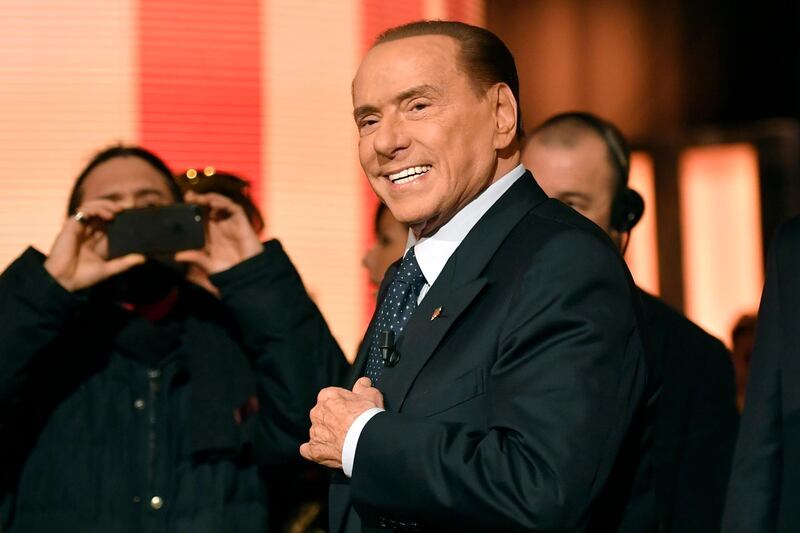It has been quite a week for the world's billionaires, as a stock rout wiped huge out amounts of cash from under their noses.
On Monday, the fortunes of the world’s 500 richest people shrank by $114 billion, with Berkshire Hathaway chairman Warren Buffett, the world’s third-richest person, was hardest hit, losing $5.1bn, according to the Bloomberg Billionaires Index.
Even Amazon founder Jeff Bezos, the world’s richest person, was not immune to the carnage. His fortune slipped $3.3bn to $116.4bn as shares of the retail behemoth fell 2.8 per cent. Alphabet’s Larry Page and Sergey Brin each took hits of about $2.3bn.
After a brief lull midweek, the red tide rolled in again and by Thursday big hitters such as Facebook’s Mark Zuckerberg, who lost US$3.4bn, were left feeling the pain.
Elon Musk came back to Earth, dropping US$1.1bn in net worth after his Space Exploration Technologies successfully launched a Tesla sports car on a journey around the sun. Shares of Tesla, which he also leads, plunged 8.6 per cent.
US stocks ended a wild week with a burst of buying, pushing the S&P 500 up 1.5 per cent on Friday, but still recorded their worst week in two years, and investors are braced for more volatile trading days ahead.
Still, even as they nurse their battered wallets, the mega wealthy still have to attend to the business of doing what they do best.
Here is The National's bi-monthly round-up of what some of the world's billionaires have been up to recently.
Italian veteran Silvio Berlusconi’s bid to return to centre stage suffered a bit of a shock when his most important ally signalled he may not be content with the role of junior coalition partner as the prospect of an unexpected majority following Italy’s election next month fuelled tensions within their alliance.
Matteo Salvini, 44, who leads the anti-migrant and eurosceptic Northern League, slapped down a Berlusconi policy proposal within hours of its launch on Wednesday, drawing mockery from their political rivals. The former prime minister, an 81-year-old billionaire, worth some $8.86bn, according to the Bloomberg Billionaires Index and who started out in construction, had offered an amnesty to property developers who’ve violated building regulations out of “necessity.”
“I say no, I say a strong no,” Mr Salvini said. “Our country is already covered by too much concrete. We need to pull down all illegal buildings.”
Mr Berlusconi and Mr Salvini are jostling for supremacy within the centre-right alliance that opinion polls suggest will form the biggest such bloc in the next parliament. Rivals have picked up on the tensions over issues from pension reform to the euro as a sign of the problems the country would face if they entered government together.
“Salvini rejects in the evening what Berlusconi says in the morning,” said Giulia Grillo, a policymaker for the populist Five Star Movement said in an emailed statement. “They don’t agree on anything. With them, Italy would be in chaos.”
Reiterating his criticism of the single currency on Wednesday, Mr Salvini said on the sidelines of a rally in Florence that it was only a matter of time before the euro collapsed and that he was “preparing an emergency exit for the Italians,” according to Reuters. Mr Berlusconi has ruled out a euro-exit.
Mr Salvini’s party has traditionally backed Mr Berlusconi's administrations, but is now vying with the media mogul’s Forza Italia to be the biggest group on the Italian right.
Mr Berlusconi’s own political career was largely written off after he was banned from holding public office following a 2013 tax-fraud conviction.
But the pact with Mr Salvini and the decline of the governing Democratic Party have left him just a few percentage points shy of a working majority after the March 4 vote. Mr Berlusconi says he’d seek to influence the government from behind the scenes if his party wins.
Still, the two groups remain uncomfortable bedfellows despite their formal alliance. Mr Salvini has said abandoning the single currency is still an option. Mr Berlusconi tweeted last month that Mr Salvini knows that’s impossible and has given up on the idea.
Observers including BNP Paribas' chief executive Jean-Laurent Bonnafe say that Mr Berlusconi could ditch the Northern League after the election to form a so-called grand coalition with the PD. Those predictions have been encouraged by Mr Berlusconi’s sniping at his coalition partner.
Mr Salvini “has a pyrotechnical way of presenting himself, he speaks to a certain type of person, but he’s not my style”, Mr Berlusconi told Rete 4 television on Tuesday. “But when Salvini sits down at a table he’s reasonable, and it’s a pleasure to make agreements with him.”
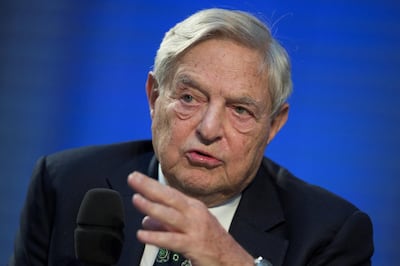
Billionaire investor George Soros has also been politically motivated of late and last week donated £400,000 (Dh2.05bn) to a campaign for influencing British policymakers to vote against a final Brexit deal, its director said Thursday amid accusations of a "plot to thwart Brexit".
"Through his foundations he has contributed £400,000," said former minister Mark Malloch-Brown, chairman of Best for Britain, which advocates for the country to remain in the EU.
The Daily Telegraph, a staunchly pro-Brexit newspaper, said Mr Soros' "campaign to overturn Brexit" was planning nationwide adverts this month "which they hope will lead to a second referendum to keep Britain in the EU."
But Mr Malloch-Brown defended the campaign, saying it was "perfectly reasonable" that Members of Parliament should have a chance to think again about going ahead with Brexit.
"There are a lot of people out there who are frustrated," he told BBC radio, adding: "A majority of MPs are still personally Remainers and yet are about to vote for anything between a hard and a soft Brexit."
Mr Soros, 87, and worth $8bn, according to the Bloomberg Billionaires Index, is a US financier and philanthropist and a favourite bete noire of nationalists around the globe from the Kremlin to his native Hungary.
He is something of a hate figure in Britain for making a billion dollars betting against sterling on Black Wednesday in 1992 when Britain was forced to withdraw the pound from the European Exchange Rate Mechanism.
In a speech at the World Economic Forum in Davos last month, Mr Soros predicted that British Prime Minister Theresa May's spell in power would not last long and said British people were "in denial" about the financial consequences of leaving the EU.
"The current economic situation is not as bad as it was predicted, they live in hope, but as the currency depreciates, and inflation will be the driving force, that will lead to declining living standards," he said.
"It's going to take some time but when it does happen, they will realise that they are earning less than before, because wages won't rise as fast as the cost of living."
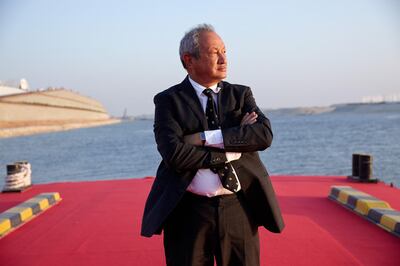
Nearer to home, Beltone Financial Holding, the Egyptian investment bank owned by billionaire Naguib Sawiris, is planning financial acquisitions to diversify the products it offers in frontier and emerging markets.
"Beltone is in a very big growth mode," the chief executive Bassem Azab said in Cairo. "We spent the past two years establishing and re-positioning ourselves in investment banking, asset management and brokerage. Now that we have our pillars reinforced on the ground, we are looking at other business lines that we want to grow."
The company is looking at acquisition opportunities in the leasing and consumer finance sectors in Egypt and might consider starting a micro-finance business, he said. Beltone is also looking to buy companies outside Egypt to diversify product offerings beyond equities, Mr Azab said.
Following its acquisition by Orascom Telecom Media and Technology late in 2015, Beltone went through an ambitious turn around that saw it buying New York-based brokerage Auerbach Grayson & Co in 2016 to boost access to the US market. Orascom is owned by Mr Sawiris who has a fortune of some $5.31bn, According to the Bloomberg index.
Beltone's revenues in the first nine months of 2017 surged as brokerage and investment banking revenues increased.
Beltone expects to manage as many as three initial public offerings in Egypt this year in the consumer, health-care and industrial sectors and has applied to co-manage a share sale in Nigeria, said the investment banking head, Sobhy El Sehrawy.
It also has an "aggressive" plan in 2018 to expand research coverage outside Egypt and add more analysts to its team, said Mostafa Abdel Aziz, the head of its brokerage unit.
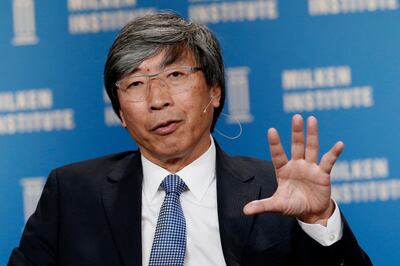
In America, the struggling Los Angeles Times found a local saviour in a biotech billionaire willing to buy the storied newspaper from a corporation half a continent away, but the change of ownership brings its own set of questions and uncertainty.
Dr Patrick Soon-Shiong agreed to pay $500 million and assume $90m in pension liabilities for the Times and San Diego Union-Tribune, the American newspaper print and online media publishing company Tronc announced Wednesday.
_______________
Read more:
Rising Middle Eastern private wealth means advisers need to stay sharp
Richest one per cent made 82% of new wealth last year, says Oxfam
_______________
The news was met with a mix of optimism and scepticism by those who have seen the fourth-largest circulation newspaper in the country plagued by cutbacks and circulation declines and roiled by leadership changes in the two decades since it was sold to Tribune Co by the Chandler family.
"Some people might think this could be the white knight, the savior, but nobody knows that," said Steve Davis, a journalism professor at Syracuse University. "All they know is that it's a change, that it's somebody new who says the right things."
The sale reflects a trend of billionaires buying up newspapers, most notably when Amazon founder Bezos bought The Washington Post in 2013 for $250m, in a move that has reinvigorated that newspaper and raised its profile.
"In general this is just another example of sort of boutique buying of newspapers," said Jack Kranefuss, a media analyst at Fitch Ratings. "It's sort of going back to the day when captains of industry owned newspapers to get their own voice out."
One of the big questions is whether Mr Soon-Shiong, worth $8.6bn, according to Bloomberg, will distance himself from the Times or will use it for influence or to advance an agenda.
Mr Soon-Shiong said in a letter sent late Wednesday to employees of the two newspapers that local ownership will give them a chance to preserve their mission and independence.
"This decision is deeply personal for me," he wrote. "As someone who grew up in apartheid South Africa, I understand the role that journalism needs to play in a free society. As residents of Southern California, my family and I have seen the vital role that these publications play in binding our communities together."
Mr Soon Shiong, 65, has been the subject of several unflattering reports, including in the Times, which have raised concerns about his business practices and charitable giving.
Among other things, an audit found that the University of Utah had accepted over $12m from a Soon-Shiong foundation and then inappropriately awarded one of his company's, NantHealth, $10m for gene sequencing, the Salt Lake Tribune reported last year.
Gabriel Kahn, a journalism professor at the University of Southern California, said Mr Soon-Shiong has "kind of a cloudy business career" that has been dogged by "very real questions about the appearance of improprieties". Mr Soon-Shiong has been in a legal fight with siblings, and sued by investors, including singer and activist Cher.
Mr Soon-Shiong has denied allegations in the suits and referred to a news story about his foundation benefiting his business as "maliciously false", the Times said.
"He's incredibly wealthy, very smart and, as tends to be the case with billionaires, he has a big ego and he has thin skin," Mr Kahn said.
If you think the booming business of sports streaming services is a sweet investment for an acquisitive billionaire like Japan's Masayoshi Son, worth $14.4bn, according to Bloomberg, you're only half right.
A billionaire is indeed big on offering live sports online in Japan, but it isn't Mr Son. It's Len Blavatnik, whose DAZN start-up is displacing SoftBank Group's Sportsnavi Live and who tops Mr Son with a wallet containing a whopping $20.7bn
Mr Blavatnik's Perform Group will take over broadcasting from Sportsnavi Live this month, while the SoftBank service will end May 31, Perform and SoftBank said, without disclosing terms.
DAZN stormed into Japan's broadcasting world almost two years ago by paying $1.9bn for streaming rights to the nation's top football organisation, J-League. Since then, it has acquired the Japan rights for sports coverage from Major League Baseball to Ultimate Fighting Championship, including last summer's $500m Mayweather-McGregor fight.
SoftBank is throwing in the towel after starting the sports streaming service in 2016.
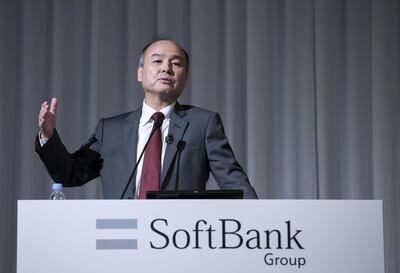
Mr Son has other business to keep him busy: on the same day DAZN announced the Sportsnavi agreement, people familiar with the matter said SoftBank is in talks to acquire as much as a third of Swiss Re, one of the world's largest reinsurers.
Mr Blavatnik, whose fortune makes him the world's 42nd wealthiest person, has experience in the entertainment industry as owner of Warner Music Group and, at one point, host of the Business of Film Lunch in Cannes with now-disgraced mogul Harvey Weinstein. Mr Son has focused on building a tech-driven investment empire under a 300-year business plan - one that for the time being, won't include a sports streaming business in Japan.
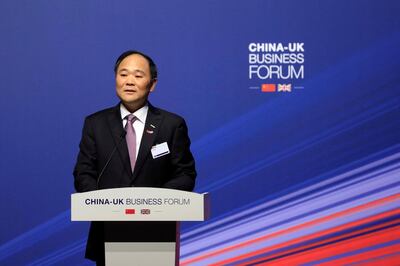
Meanwhile a Chinese billionaire and the owner of Geely Automobile and Sweden's Volvo Cars, said he's on target to take his growing automotive empire to the next level in Europe, sidestepping speculation on his reported investment in Mercedes-Benz parent Daimler.
Li Shufu, after reviving Volvo Cars, has stepped up purchases of a broad suite of industry stakes and brands, spending $3.9bn in December to become the biggest shareholder of Volvo AB, the world's second-largest lorry maker. Prior to the deal, reports surfaced Daimler rebuffed an approach to sell a 5 per cent minority stake to Geely's parent at a discount. Geely has purchased Daimler shares in the open market since,
Handelsblatt reported this month.
Europe plays "a very important role for the development of automotive brands under our leadership," Mr Li, worth some $12.9bn, said in a video statement at the CAR Institute conference in Bochum, Germany. "Building up brands in the European market has been the
goal from the start." Mr Li's ambition to expand to Europe started with the 2010 acquisition of Volvo Cars from Ford Motor, defying scepticism to revive the ailing brand with a fresh lineup of 4x4s. Last year, he won control of British sportscar maker Lotus Cars and previously purchased Manganese Bronze in 2013, rescuing the maker of London's iconic black cabs after the UK car maker entered administration.
The Chinese carmaker also plans to introduce its new brand Lynk & Co., which has started sales in its home country, to Europe.
"Together we want to bring the auto industry to the next level," Mr Li said.
Daimler has said it would welcome any long-term investor buying shares on the open market, declining to comment specifically on Hangzhou-based Geely.
Mr Li started out making refrigerator parts and later turned Geely into one of China's biggest privately-owned car makers. Demand growth in China, the world's biggest car market, is cooling after years of rapid expansion, moving expansion into different parts of the world into focus.
Geely, facing industrywide pressures in the switch to electric and self-driving vehicles, is "very open" about entering cooperations, said Carl-Peter Forster, who sits on both Geely and Volvo Cars' boards.
Geely is already benefiting from sharing technology across the group and purchasing locally in China, he said.
"The entrepreneurial responsibility remains with the individual company," the former head of General Motors' European operations and Tata Motors executive said, labelling "speculative" the reports about Daimler shares
purchases.
“But when you plan future investments you might realise that it doesn’t always work on your own."
